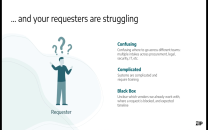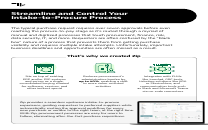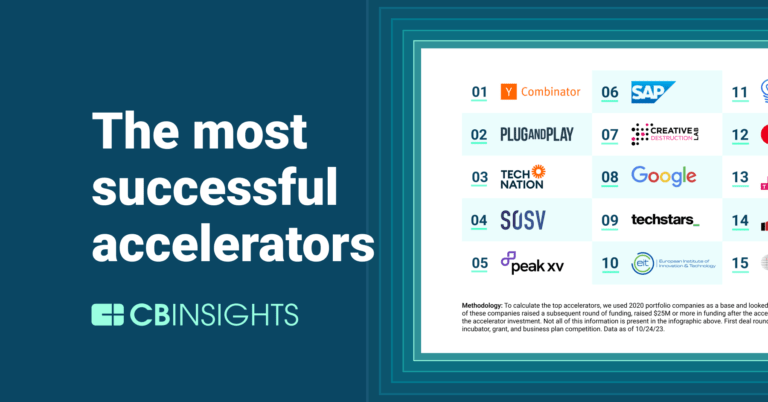
Zip
Founded Year
2020Stage
Series D | AliveTotal Raised
$358.13MValuation
$0000Last Raised
$190M | 6 mos agoMosaic Score The Mosaic Score is an algorithm that measures the overall financial health and market potential of private companies.
+97 points in the past 30 days
About Zip
Zip is a procurement orchestration platform that focuses on the procurement process across various business functions. The company provides services including intake management, procure-to-pay automation, and sourcing process optimization, aimed at improving visibility, control, and efficiency in organizational spending. Zip serves sectors such as life sciences, financial services, and technology, offering solutions for startups, mid-market, and enterprise-level businesses. Zip was formerly known as Evergreen. It was founded in 2020 and is based in San Francisco, California.
Loading...
Zip's Product Videos


ESPs containing Zip
The ESP matrix leverages data and analyst insight to identify and rank leading companies in a given technology landscape.
The procure-to-pay market addresses all aspects of purchasing goods and services, from procurement to payment. This market includes technology solutions to automate and streamline this process, improving efficiency, reducing costs, and minimizing the risk of errors and fraud. These platforms feature spend management capabilities, supplier onboarding and management tools, purchase order processing,…
Zip named as Challenger among 15 other companies, including Esker, AvidXchange, and Tata Consultancy Services.
Zip's Products & Differentiators
Zip Intake-to-Procure
Drive enterprise-wide purchasing policy adoption to unlock spend control and visibility. Zip Intake-to-Procure centralizes intake for any procurement request and automatically orchestrates cross-functional approvals. Make process compliance intuitive while eliminating manual collaboration from requests, approvals, and vendor onboarding with an enterprise-grade, no-code workflow platform.
Loading...
Research containing Zip
Get data-driven expert analysis from the CB Insights Intelligence Unit.
CB Insights Intelligence Analysts have mentioned Zip in 2 CB Insights research briefs, most recently on Dec 8, 2023.

Dec 8, 2023 report
The top 25 most successful startup accelerators
Oct 12, 2023
The procurement tech market mapExpert Collections containing Zip
Expert Collections are analyst-curated lists that highlight the companies you need to know in the most important technology spaces.
Zip is included in 4 Expert Collections, including Unicorns- Billion Dollar Startups.
Unicorns- Billion Dollar Startups
1,270 items
Fintech
9,466 items
Companies and startups in this collection provide technology to streamline, improve, and transform financial services, products, and operations for individuals and businesses.
Fintech 100
100 items
Artificial Intelligence
7,632 items
Latest Zip News
Apr 2, 2025
By PYMNTS | April 2, 2025 | Highlights President Trump announced broad, country-based tariffs including a 10% blanket tariff on imports, and specific duties such as 34% on China, 20% on the EU, 26% on India, 31% on Switzerland, and 24% on Japan. Additionally, 25% tariffs on automobile imports will take effect on April 3, with similar tariffs on auto parts following a month later. The newly imposed tariffs are causing disruption across global supply chains, forcing companies to adapt while ensuring compliance with regulations, including Know Your Business (KYB) protocols. Companies are deploying technological solutions to better manage supplier risks and optimize procurement processes, leaning on KYB to avoid fraudulent practices and ensure compliance amid geopolitical and economic shifts, while leveraging digital innovations to improve vendor relationships and cost management. There’s a trade war happening. Governments around the world are imposing and adjusting tariffs to address shifting geopolitical and economic realities. The corresponding supply chain uncertainty has thrown many enterprise back offices into turmoil. On Wednesday (April 2), at an event entitled the “Make America Wealthy Again Event” during what the administration has termed “ Liberation Day ,” President Donald Trump announced his sweeping reciprocal, country-based tariffs, clarifying that the White House executive order means, “They do it to us, we do it to them.” Displaying a posterboard to outline the new measures, the president explained that his concept of reciprocal tariffs wouldn’t necessarily mean parity. Many of the tariffs on U.S. trading partners settled at around half, or less, with China being levied duties of 34%, the EU 20%, India 26%, Switzerland 31%, Japan 24%, among many others. Trump also announced a 10% blanket tariff on imports. In advance of the Rose Garden event, the U.S. government also let it be known earlier Wednesday that, effective at midnight April 3, the U.S. will impose 25% tariffs on automobile imports. A similar tax on auto parts will go into effect a month later. The tariffs announced Wednesday join the tariffs Trump has already imposed on Canada, Mexico and China, and on automobiles, steel and aluminum . The implications are as vast as they are immediate. From global supply chains to financial transactions, the recalibration of tariffs could have far-reaching consequences. As enterprises grapple with new realities, the relationship between tariffs and know-your-business (KYB) compliance has become intertwined. Tariffs can incentivize companies to shift suppliers or partners, particularly when seeking to avoid higher costs. At the same time, when tariffs are imposed or adjusted, businesses must ensure compliance not only with customs regulations but also with broader compliance frameworks, including KYB. Rushing to onboard new suppliers without thorough KYB checks increases the risk of engaging with disreputable or noncompliant entities. Tariff changes often indicate broader geopolitical shifts that can result in sanctioned entities or heightened scrutiny of specific business relationships. Tariffs and KYB Tariffs are taxes or duties levied on imported or exported goods. Often used as instruments of economic protectionism or as responses to unfair trade practices, tariffs are also tools for revenue generation and political leverage. Their application can vary significantly depending on the industry, the origin of goods, and the political relations between trading nations. KYB refers to the due diligence businesses must undertake to verify the legitimacy, structure, ownership and operational integrity of their partners, suppliers or clients. KYB has become a critical element of corporate compliance, particularly for financial institutions and multinational corporations managing complex supply chains. Increasing tariffs can create incentives for businesses to resort to fraudulent practices such as transshipment, undervaluation, or misclassification of goods. Robust KYB protocols are instrumental in helping to detect these schemes and safeguard corporate compliance and reputation. KYB as Compass The global supply chain has always been intricate, but recent developments have added layers of complexity atop the multitude of dependencies many industries have on their supplier bases. “There’s technology that can help,” Matt Carey , senior vice president, Office of the CFO at FIS , told PYMNTS. “But it really depends on the industry. If I’m a computer manufacturer and I have a bunch of chips on order from my suppliers, I can’t just change my chip supplier overnight.” “If I have visibility into my working capital, I can negotiate better agreements and pre-buy materials like aluminum or steel,” Carey added. “If you don’t have a centralized view of your financials, it’s tough to negotiate with an upper hand.” PYMNTS covered Monday (April 1) how Walmart is reportedly pushing suppliers in China to reduce prices to mitigate new tariffs. Meanwhile, PYMNTS on Wednesday examined how the tariffs — and other economic pressures — are impacting consumer spending . And as PYMNTS Intelligence data in the March 2025 Certainty Project reveals, escalating trade tensions marked by the recent imposition of tariffs have introduced a wave of uncertainty across various sectors, notably impacting mid-sized companies. Fortunately, the marketplace is responding. Zip on Tuesday added a solution for supplier risk management to its procurement orchestration platform; while Clearco , a provider of growth capital for eCommerce, on Wednesday teamed with Cavela to allow access to Clearco’s capital to pay manufacturers and suppliers more efficiently, with the goal of improving vendor relationships and managing costs, particularly in light of tariffs. Recommended
Zip Frequently Asked Questions (FAQ)
When was Zip founded?
Zip was founded in 2020.
Where is Zip's headquarters?
Zip's headquarters is located at 1 Sansome Street, San Francisco.
What is Zip's latest funding round?
Zip's latest funding round is Series D.
How much did Zip raise?
Zip raised a total of $358.13M.
Who are the investors of Zip?
Investors of Zip include Y Combinator, Charles River Ventures, Bond, Alkeon Capital Management, Adams Street Partners and 6 more.
Who are Zip's competitors?
Competitors of Zip include JustPaid and 5 more.
What products does Zip offer?
Zip's products include Zip Intake-to-Procure and 1 more.
Who are Zip's customers?
Customers of Zip include Databricks, Lattice and Canva.
Loading...
Compare Zip to Competitors

Iq Software Services specializes in IT development services within the technology sector. The company offers data analytics solutions, API development and integration, and cloud-native application development. Iq Software Services primarily caters to sectors such as healthcare, retail, finance, automotive, and independent software vendors. It was founded in 2003 and is based in Bangalore, India.

Ramp offers a financial operations platform that provides spend management services for businesses. It offers services including corporate cards, expense management, accounts payable solutions, and accounting automation. Its platform serves startups, small businesses, mid-market companies, and enterprises across sectors. It was founded in 2019 and is based in New York, New York.

Glean AI specializes in accounts payable automation and spend intelligence within the financial software sector. The company offers a platform that streamlines accounts payable processes through automated data extraction, GL coding, bill approvals, payments, and financial insights to help businesses manage and optimize their vendor spend. Glean AI primarily serves accounting and finance teams looking to enhance efficiency and gain strategic insights into their spending patterns. It was founded in 2019 and is based in New York, New York.

Kyriba operates within the financial technology sector and focuses on liquidity performance. Its offerings include a platform for cash and treasury management, risk management, and payment processing. Kyriba serves sectors such as finance, technology, retail, manufacturing, and insurance, targeting CFOs, treasurers, and IT leaders. It was founded in 2000 and is based in San Diego, California.

Procurify offers a procure-to-pay platform that supports purchasing and accounts payable automation. It enables organizations to manage their business spending. Procurify's solutions serve various sectors, including technology, healthcare, biotech, manufacturing, consumer packaged goods, education, charter schools, and nonprofit organizations. It was founded in 2012 and is based in Vancouver, Canada.

Stampli focuses on accounts payable automation and invoice management. It offers a range of products to provide efficiency, visibility, and control for payments, employee expenses, corporate credit card spending, and vendor management. Stampli's services are primarily utilized by sectors such as healthcare, hospitality, professional services, construction, retail, and manufacturing. The company was founded in 2014 and is based in Mountain View, California.
Loading...
